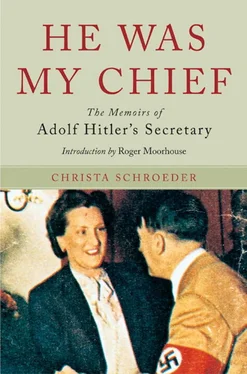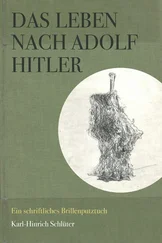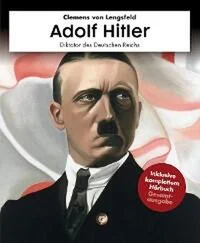Christa Schroeder - He Was My Chief - The Memoirs of Adolf Hitler's Secretary
Здесь есть возможность читать онлайн «Christa Schroeder - He Was My Chief - The Memoirs of Adolf Hitler's Secretary» весь текст электронной книги совершенно бесплатно (целиком полную версию без сокращений). В некоторых случаях можно слушать аудио, скачать через торрент в формате fb2 и присутствует краткое содержание. Город: Barnsley, Год выпуска: 2012, ISBN: 2012, Издательство: Frontline Books, Жанр: История, Биографии и Мемуары, на английском языке. Описание произведения, (предисловие) а так же отзывы посетителей доступны на портале библиотеки ЛибКат.
- Название:He Was My Chief: The Memoirs of Adolf Hitler's Secretary
- Автор:
- Издательство:Frontline Books
- Жанр:
- Год:2012
- Город:Barnsley
- ISBN:978-1-7830-3064-4
- Рейтинг книги:4 / 5. Голосов: 1
-
Избранное:Добавить в избранное
- Отзывы:
-
Ваша оценка:
- 80
- 1
- 2
- 3
- 4
- 5
He Was My Chief: The Memoirs of Adolf Hitler's Secretary: краткое содержание, описание и аннотация
Предлагаем к чтению аннотацию, описание, краткое содержание или предисловие (зависит от того, что написал сам автор книги «He Was My Chief: The Memoirs of Adolf Hitler's Secretary»). Если вы не нашли необходимую информацию о книге — напишите в комментариях, мы постараемся отыскать её.
He Was My Chief: The Memoirs of Adolf Hitler's Secretary — читать онлайн бесплатно полную книгу (весь текст) целиком
Ниже представлен текст книги, разбитый по страницам. Система сохранения места последней прочитанной страницы, позволяет с удобством читать онлайн бесплатно книгу «He Was My Chief: The Memoirs of Adolf Hitler's Secretary», без необходимости каждый раз заново искать на чём Вы остановились. Поставьте закладку, и сможете в любой момент перейти на страницу, на которой закончили чтение.
Интервал:
Закладка:
Kannenberg himself was small and round, but unusually mobile, even bouncy. He always reminded me of a rubber ball. He had rather protuberant◦– even hyperthyroidic◦– eyes and was perhaps unstable emotionally. Unfortunately he liked intrigue and playing on words: house manager-house manipulator was always a phrase that came to my mind when I thought about him. It was Kannenberg who engineered the fall from grace of Hitler’s long-serving chief adjutant Wilhelm Brückner and the transfer of orderly officer Max Wünsche [41] Max Wünsche (b. 20.4.1914 Kittlitz, d. 17.4.1995 Munich). 10.7.1933 joined LSSAH; 25.4.1935◦– 31.3.1936 SS-Junker School at Bad Tölz; 20.4.1936 SS-Untersturmführer; 11.9.1938 SS-Obersturmführer, detached to Hitler as orderly officer and later to adjutant until 24.1.1940, duty at Front; 1.6.1940 returned to FHQ as adjutant; 18.10.1940 dismissed with Brückner by Hitler; as an SS man highly decorated; 24.8.1944 SS-Obersturmbannführer and regimental commander; PoW (British); released 1948.
to the Front. Both were victims of Kannenberg’s intrigues.
In the Führer-apartment and at Obersalzberg the orderlies, or whatever one likes to call them, good-looking young men who wore a white dinner jacket with neck collars, and black trousers, worked as servants, valets and waiters. They were seconded from the SS-Leibstandarte Adolf Hitler and after a training course at the Pasing Waiter’s School were attached to the serving staff of Hitler’s household. This brought them into Kannenberg’s empire, although they were not employed by him or to serve under him. This cut both ways, for Kanneberg felt that he ought to be able to regiment them as he did his own people. This was naturally not acceptable to the SS-Leibstandarte men and they gave adjutant Max Wünsche plenty of opportunity to intercede on their behalf. He had one particular altercation with Kanneberg on personnel matters which the latter did not forget.
When the Italian princess Mafalda visited in 1940, Kannenberg was ordered to Obersalzberg but did not arrive until after adjutant Wünsche and housekeeper Josefa had got everything arranged. Brückner had not been involved in it at all. Hitler was delighted that everything had gone off so well and he praised Kanneberg for the excellent preparations, which of course had not been his. Kannenberg now seized the opportunity to unleash his grudge against Wünsche. Hitler was convinced and ordered Brückner to his presence. When Brückner took the side of Wünsche against Kanneberg, Hitler dismissed Brückner on the spot and sent Wünsche to the Front.
Hitler probably realised later that he had been sold a dummy by Kannenberg but that did nothing to lower Kannenberg in the Führer’s estimation. Since Hitler was so anxious that everything should run perfectly at state banquets and the annual festivals for the arts, and Kannenberg had never let him down, and had always provided the fullest satisfaction, it was not surprising that in time Kannenberg would be allowed some leeway to play the fool. Hitler valued his technical capabilities and enjoyed his clowning, which Kannenberg had brought to a fine art in the 1930s during the picnic outings. On these occasions Kannenberg would delight Hitler and guests with his music and clowning. A pictorial book published by Heinrich Hoffmann in 1937, Hitler abseits vom Alltag , has a number of photos (e.g. ‘A carefree hour in the Harz’) which show Hitler in the completely relaxed type of mood such as he rarely enjoyed later. Kannenberg left the Reich Chancellery in 1945, shortly before the collapse, and fled to the Thumsee in the south. Later in Düsseldorf he opened a hostelry, the Schneider Wibbel Stube, which attracted a lively affluent clientele, perhaps because Kannenberg still had the knack of amusing and entertaining his guests.
But back to the Reich Chancellery. Directly opposite the door to Hitler’s study a couple of steps led to a long corridor, beyond which was the so-called adjutancy wing with the rooms for Hitler’s aides. The first room was the Staircase Room ( Treppenzimmer ) which will often be mentioned again. Then one came to the rooms of Schaub, Dr Dietrich (Reich press officer), Sepp Dietrich and Brückner (later Alwin-Broder Albrecht). If one went beyond these and descended the staircase one came to the so-called ladies’ saloon, actually the reception room, to the left of which wing doors, always pegged open, led into the film room with its hearth. To the right was the Bismarck room, also known as the smoking room. The dining hall was next to it and annexed to the elongated Winter Garden with its chintz-covered armchairs. The far end of the Winter Garden ended in a fine semi-circular path. From the tall glass doors at that end one had a panorama of the trees in the Reich Chancellery park.
Breakfast was taken in the Winter Garden. Wilhelm Brückner used to say that ‘breakfast is the nicest time of year’ and he would readily accept any excuse to be delayed in the Winter Garden. In the afternoon Hitler held most of his talks strolling its length. He only used his office when Secretary of State Lammers made an appointment for him there expressly. When I was settled into the Personal Adjutancy in the spring of 1934, the regular mealtimes were initially taken with Sepp Dietrich, Dr Dietrich, the SS-Führers and men of the SS-Begleitkommando , the adjutants and servants. We ate in the basement of the Department for Economics at the Radziwill Palace. On Hitler’s orders guests and staff in the basement dining room received the same fare as was served in the dining room to the Führer-apartment. There was no difference in the menu. In later years we secretaries would eat mostly in the Staircase Room which, as I mentioned previously, was at the entrance to the adjutancy wing. We also took our afternoon tea there.
One day Hitler happened to pass the Staircase Room, saw us sitting there and asked if he might join us. This hour of easy chatter, which developed quite naturally, was so much to his liking that he would often come by at this hour and later came to tea almost daily. The afternoon tea hour in the Staircase Room became a fairly fixed ritual. Usually we two secretaries would keep Hitler company, later occasionally all three, namely Johanna Wolf, Gerda Daranowski and myself.
Actually the Staircase Room was rather functional. It had a very high ceiling and was only used for visitors in an emergency because it had no bath, only a washstand with mirror. The simple furnishings were a chintz-covered couch, a wardrobe, a safe, the typists’ table, lamp standard and octagonal table with wickerwork chairs. From when war broke put in 1939 we secretaries served mostly at the current FHQ then in use, or on an alternating roster. The Staircase Room was our permanent office for when we were in Berlin, although purpose-built work rooms were planned for us in the new Reich Chancellery they proved too far away. There was no fixed eight-hour day. We were on call twenty-four hours and had to be permanently at Hitler’s disposal, and since Hitler stayed in his apartment, except when engaged in official conferences, we were closer to him in the Staircase Room than the new Reich Chancellery and within immediate reach. His study, the library, his bedroom and later alongside it Eva Braun’s apartment were all on the first floor of the Radziwill Palace.
Despite the simple furnishings of the Staircase Room Hitler liked it very much. It was a place where he could relax and I always had the impression that he felt unburdened there. He used to talk about the experiences of his youth and the past, subjects which he might never mention again, or would touch upon later in the evening tea circle and at table in the FHQ officers’ mess. One felt that what he said in the Staircase Room came from a secret memory box which at all other times he kept locked shut.
Читать дальшеИнтервал:
Закладка:
Похожие книги на «He Was My Chief: The Memoirs of Adolf Hitler's Secretary»
Представляем Вашему вниманию похожие книги на «He Was My Chief: The Memoirs of Adolf Hitler's Secretary» списком для выбора. Мы отобрали схожую по названию и смыслу литературу в надежде предоставить читателям больше вариантов отыскать новые, интересные, ещё непрочитанные произведения.
Обсуждение, отзывы о книге «He Was My Chief: The Memoirs of Adolf Hitler's Secretary» и просто собственные мнения читателей. Оставьте ваши комментарии, напишите, что Вы думаете о произведении, его смысле или главных героях. Укажите что конкретно понравилось, а что нет, и почему Вы так считаете.












